Unit 5 Wild animals-Grammar课件(共17张PPT)
文档属性
| 名称 | Unit 5 Wild animals-Grammar课件(共17张PPT) | 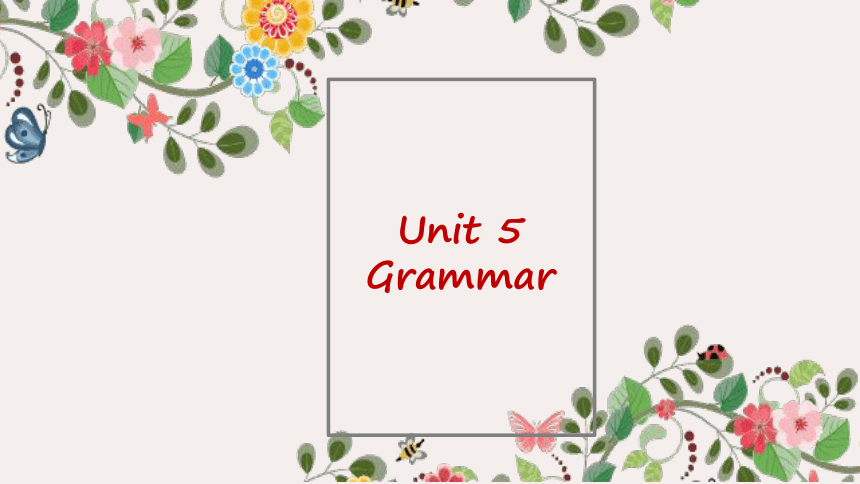 | |
| 格式 | zip | ||
| 文件大小 | 951.3KB | ||
| 资源类型 | 教案 | ||
| 版本资源 | 牛津译林版 | ||
| 科目 | 英语 | ||
| 更新时间 | 2022-07-19 13:20:27 | ||
图片预览

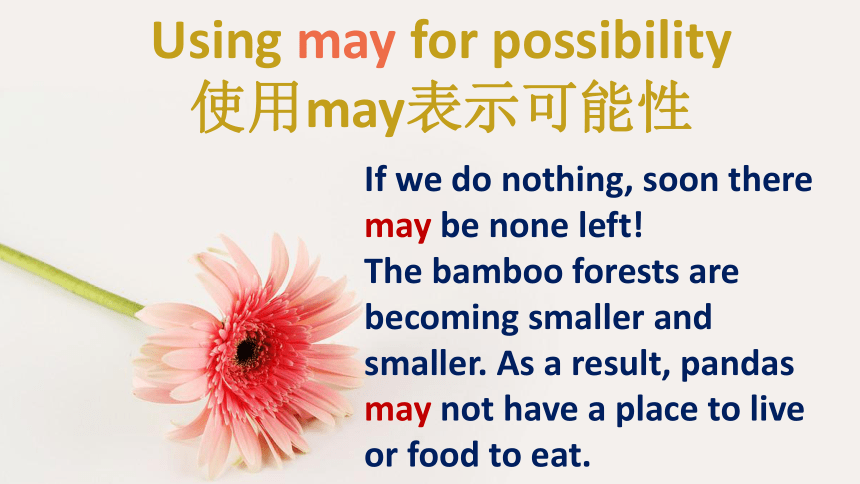

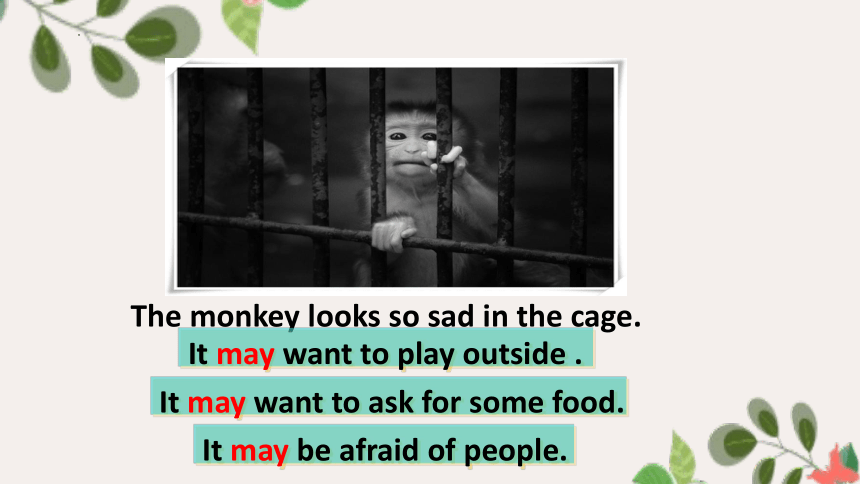

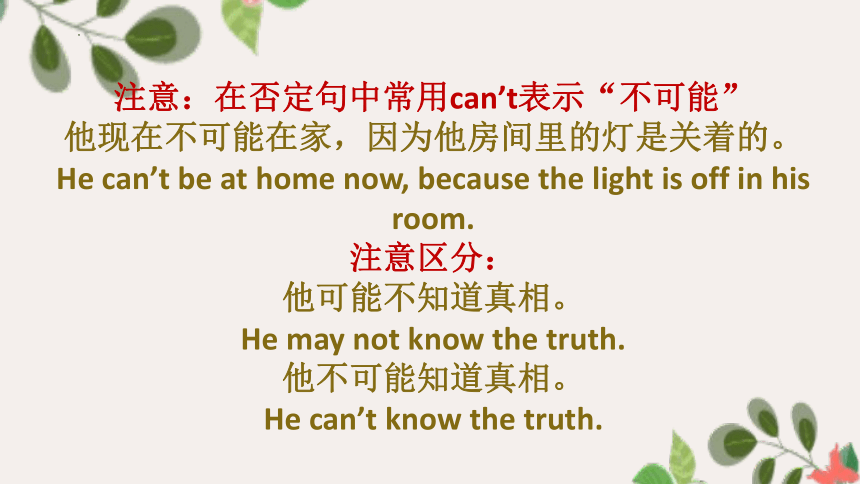
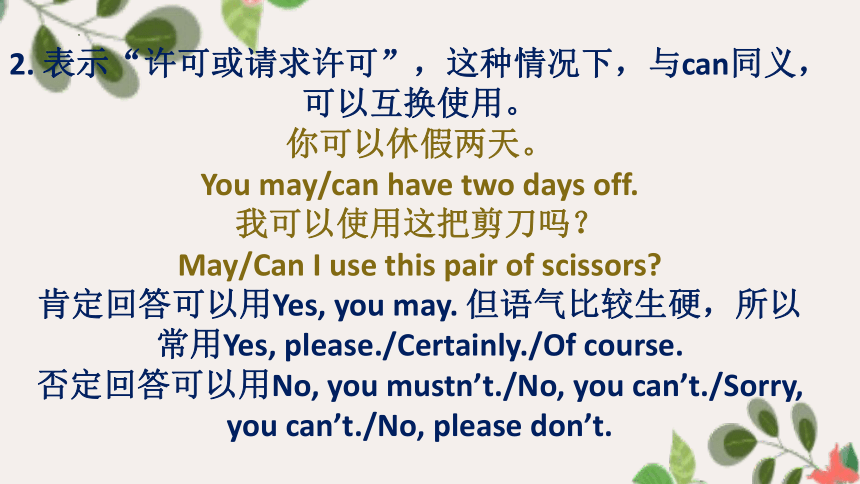
文档简介
(共17张PPT)
Unit 5 Grammar
Using may for possibility
使用may表示可能性
If we do nothing, soon there may be none left!
The bamboo forests are becoming smaller and smaller. As a result, pandas may not have a place to live or food to eat.
may not do... 意为“可能不......”
情态动词may 表示可能性,
后加动词原形
The monkey looks so sad in the cage.
It may want to play outside .
It may want to ask for some food.
It may be afraid of people.
may主要用法归纳:
1. 表示“可能性”,常用于肯定句或否定句中。
他可能自己动手做,而不是花钱请别人做。
He may do a DIY job, instead of paying someone else to do it.
Daniel可能不会独自装饰房间。
Daniel may not decorate the room by himself.
注意:当表示“可能性”时,may通常不用于一般疑问句中。
那会是真的吗?
May that be true × Can that be true √
注意:在否定句中常用can’t表示“不可能”
他现在不可能在家,因为他房间里的灯是关着的。
He can’t be at home now, because the light is off in his room.
注意区分:
他可能不知道真相。
He may not know the truth.
他不可能知道真相。
He can’t know the truth.
2. 表示“许可或请求许可”,这种情况下,与can同义,可以互换使用。
你可以休假两天。
You may/can have two days off.
我可以使用这把剪刀吗?
May/Can I use this pair of scissors
肯定回答可以用Yes, you may. 但语气比较生硬,所以常用Yes, please./Certainly./Of course.
否定回答可以用No, you mustn’t./No, you can’t./Sorry, you can’t./No, please don’t.
Using verbs + to-infinitives
使用“动词+不定式”
在英语中某些及物动词后接动词不定式作宾语,
常用的此类动词有:
agree to do sth. 同意做某事
begin to do sth. 开始做某事
decide to do sth. 决定做某事
fail to do sth. 做某事失败
forget to do sth. 忘记做某事
hope to do sth. 希望做某事
learn to do sth. 学着做某事
plan to do sth. 计划做某事
prepare to do sth. 准备做某事
remember to do. 记得做某事
try to do sth. 尝试做某事
want to do sth. 想要做某事
to do 做宾语补足语
ask sb. to do 叫某人做某事
tell sb. to do 告诉某人做某事
invite sb. to do 邀请某人做某事
want sb. to do 想要某人做某事
would like sb. to do 想要某人做某事
teach sb. to do 教某人做某事
advise sb. to do 建议某人做某事
但有的动词后跟不带to的不定式作宾补,常见如下:
make sb. do 使某人做某事
let sb. do 让某人做某事
see/hear/watch sb. do sth. 看到/听到/观察到
某人做某事(整个过程)或经常性
remember to do sth. 记得去做某事
remember doing sth. 记得做过某事
注意区别:
forget to do sth. 忘记去做某事
forget doing sth. 忘记做过某事
stop to do sth. 停下(正在做的)事去做
(另一件)事
stop doing sth. 停止做(正在做的)事
see/hear/watch sb. do sth. 看到/听到/观察到
某人做某事(整个过程)或经常性
see/hear/watch sb. doing sth. 看到/听到/观察到
某人正在做某事
Exercises
1. The elephant is going towards the water.
It _______________ (need) a bath.
2. The little boy is crying because he sees the tigers.
He ______________ (be) afraid of them.
3. I cannot go near the lions and tigers.
They _____________ (hurt) me.
4. The baby panda is not drinking its mum’s milk.
It______________ (not be) hungry.
5. The monkeys are jumping around.
They _____________ (be playing) with each other.
6. The horse is standing with its eyes closed.
It _______________ (be sleeping)
may need
may be
may hurt
may not be
may be playing
may be sleeping
Dad: Do you know anything special about wild animals
Amy: Yes, Dad. For example, dolphins are clever. They
can _________________ (learn, work out) easy
Maths problems.
Dad: What do you know about bats
Amy: Bats can’t see, but they never ____________(fail, fly)
the right way with the help of their mouth and ears.
Dad: Did you know that bees never get lost
Amy: Yes. Bees always_________________________
(remember, come back) the same way as they go.
Dad: What do you know about squirrels
Amy: They always ______________ (begin, save) some food
before winter comes.
Dad: Yes, but sometimes they forget where to find the food.
learn to work out
fail to fly
remember to come back
begin to save
Exercises
Failure is the mother of success.
失败是成功之母。
Unit 5 Grammar
Using may for possibility
使用may表示可能性
If we do nothing, soon there may be none left!
The bamboo forests are becoming smaller and smaller. As a result, pandas may not have a place to live or food to eat.
may not do... 意为“可能不......”
情态动词may 表示可能性,
后加动词原形
The monkey looks so sad in the cage.
It may want to play outside .
It may want to ask for some food.
It may be afraid of people.
may主要用法归纳:
1. 表示“可能性”,常用于肯定句或否定句中。
他可能自己动手做,而不是花钱请别人做。
He may do a DIY job, instead of paying someone else to do it.
Daniel可能不会独自装饰房间。
Daniel may not decorate the room by himself.
注意:当表示“可能性”时,may通常不用于一般疑问句中。
那会是真的吗?
May that be true × Can that be true √
注意:在否定句中常用can’t表示“不可能”
他现在不可能在家,因为他房间里的灯是关着的。
He can’t be at home now, because the light is off in his room.
注意区分:
他可能不知道真相。
He may not know the truth.
他不可能知道真相。
He can’t know the truth.
2. 表示“许可或请求许可”,这种情况下,与can同义,可以互换使用。
你可以休假两天。
You may/can have two days off.
我可以使用这把剪刀吗?
May/Can I use this pair of scissors
肯定回答可以用Yes, you may. 但语气比较生硬,所以常用Yes, please./Certainly./Of course.
否定回答可以用No, you mustn’t./No, you can’t./Sorry, you can’t./No, please don’t.
Using verbs + to-infinitives
使用“动词+不定式”
在英语中某些及物动词后接动词不定式作宾语,
常用的此类动词有:
agree to do sth. 同意做某事
begin to do sth. 开始做某事
decide to do sth. 决定做某事
fail to do sth. 做某事失败
forget to do sth. 忘记做某事
hope to do sth. 希望做某事
learn to do sth. 学着做某事
plan to do sth. 计划做某事
prepare to do sth. 准备做某事
remember to do. 记得做某事
try to do sth. 尝试做某事
want to do sth. 想要做某事
to do 做宾语补足语
ask sb. to do 叫某人做某事
tell sb. to do 告诉某人做某事
invite sb. to do 邀请某人做某事
want sb. to do 想要某人做某事
would like sb. to do 想要某人做某事
teach sb. to do 教某人做某事
advise sb. to do 建议某人做某事
但有的动词后跟不带to的不定式作宾补,常见如下:
make sb. do 使某人做某事
let sb. do 让某人做某事
see/hear/watch sb. do sth. 看到/听到/观察到
某人做某事(整个过程)或经常性
remember to do sth. 记得去做某事
remember doing sth. 记得做过某事
注意区别:
forget to do sth. 忘记去做某事
forget doing sth. 忘记做过某事
stop to do sth. 停下(正在做的)事去做
(另一件)事
stop doing sth. 停止做(正在做的)事
see/hear/watch sb. do sth. 看到/听到/观察到
某人做某事(整个过程)或经常性
see/hear/watch sb. doing sth. 看到/听到/观察到
某人正在做某事
Exercises
1. The elephant is going towards the water.
It _______________ (need) a bath.
2. The little boy is crying because he sees the tigers.
He ______________ (be) afraid of them.
3. I cannot go near the lions and tigers.
They _____________ (hurt) me.
4. The baby panda is not drinking its mum’s milk.
It______________ (not be) hungry.
5. The monkeys are jumping around.
They _____________ (be playing) with each other.
6. The horse is standing with its eyes closed.
It _______________ (be sleeping)
may need
may be
may hurt
may not be
may be playing
may be sleeping
Dad: Do you know anything special about wild animals
Amy: Yes, Dad. For example, dolphins are clever. They
can _________________ (learn, work out) easy
Maths problems.
Dad: What do you know about bats
Amy: Bats can’t see, but they never ____________(fail, fly)
the right way with the help of their mouth and ears.
Dad: Did you know that bees never get lost
Amy: Yes. Bees always_________________________
(remember, come back) the same way as they go.
Dad: What do you know about squirrels
Amy: They always ______________ (begin, save) some food
before winter comes.
Dad: Yes, but sometimes they forget where to find the food.
learn to work out
fail to fly
remember to come back
begin to save
Exercises
Failure is the mother of success.
失败是成功之母。
